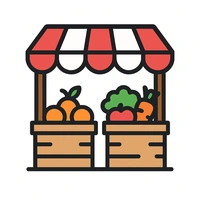
Best Local Markets in Tokyo, Japan
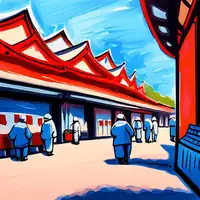
1. Tsukiji Outer Market
Tsukiji Outer Market is a bustling area where you can find fresh seafood, fruits, and Japanese delicacies. It is lively and provides a glimpse into Tokyo's food culture.
- Location: Easily accessible in the heart of Tokyo.
- Variety: Offers extensive choices of seafood and other foods.
- Freshness: Known for fresh products daily.
- Atmosphere: Vibrant and busy with lots of tourists and locals.
- Price: Some items can be pricey due to quality.
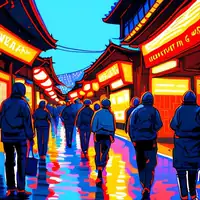
2. Ameya-Yokocho (Ameyoko) Market
Ameya-Yokocho, often referred to as Ameyoko, is a lively street market that stretches between Ueno and Okachimachi. It has everything from food to clothing and is known for its lively atmosphere.
- Diversity: Wide range of goods including clothes, accessories, and street food.
- Accessibility: Conveniently located between two train stations.
- Bargaining: Known for its open-air stalls where you can engage in bargaining.
- Crowd Level: Often crowded, especially during holidays.
- History: Rich historical background as a post-war black market.
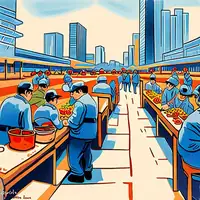
3. Toyosu Fish Market
Toyosu Fish Market, which took over from the old Tsukiji Market, is the main wholesale market in Tokyo. It's the new home to the famous tuna auctions.
- Modern Facilities: High-tech and cleaner than the old location.
- Guided Tours: Offers tours to understand market operations.
- Auction Views: Designated areas to watch the tuna auctions.
- Accessibility: Located a bit further from central Tokyo.
- Family-Friendly: Suitable for all ages with educational benefits.
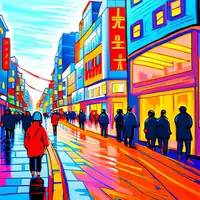
4. Yanaka Ginza
Yanaka Ginza is a nostalgic shopping street in the Yanaka district. It is known for its retro charm and warm, friendly atmosphere.
- Ambiance: Offers a laid-back, old-Tokyo vibe.
- Specialty Shops: Unique shops with traditional goods.
- Pet-Friendly: Many people bring their pets along the street.
- Price: Generally affordable items and snacks.
- Local Insights: Provides a local experience away from tourist hotspots.
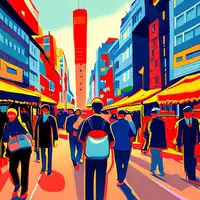
5. Shimokitazawa Market
Shimokitazawa is a trendy area with a market known for its vintage clothes, quirky shops, and artisanal goods.
- Uniqueness: Known for vintage and indie fashion.
- Trendy Factor: Popular with young locals seeking alternative styles.
- Accessibility: Easily reachable by train from Shibuya.
- Community Vibe: Strong sense of community and individuality.
- Creative Scene: Hub for art, music, and theater.

6. Kappabashi Street
Kappabashi, or Kitchen Town, is the go-to place for kitchenware and restaurant supplies. It's perfect for both professionals and home cooks.
- Specialty: Largest selection of kitchen-related goods.
- Educational: Offers insights into Japanese culinary traditions.
- Uniqueness: Famous for realistic plastic food models.
- Professional Grade: High-quality tools for serious cooks.
- Location: Centrally located near Asakusa.
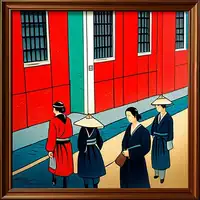
7. Oedo Antique Market
Held monthly in Tokyo's bustling district, the Oedo Antique Market features diverse antiques and vintage items.
- Rarity: Offers one-of-a-kind antique finds.
- History: Items reflect Japan’s rich history and heritage.
- Occasion: Only held on certain dates, check ahead.
- Enthusiasm: Attracts both collectors and casual shoppers.
- Price: Pricing can vary greatly based on the rarity.

8. Akihabara Radio Center
Akihabara Radio Center is one of the oldest markets in Tokyo for electronic components and DIY electronics.
- Niche Market: A haven for electronics enthusiasts.
- Historical Significance: Long-standing tradition in Akihabara.
- Expertise: Opportunity to meet knowledgeable sellers.
- DIY-Friendly: Vast array of parts for tech projects.
- Location: Centrally located in Akihabara, the electronics district.

9. Shibuya Mark City Food Court
Inside the bustling Shibuya district, Mark City Food Court offers a wide variety of delicious meals and takes from across Japan.
- Convenience: Centrally located near Shibuya Station.
- Variety: Diverse culinary options in one place.
- Quick Service: Ideal for those on the go.
- Modern Setting: Stylish and comfortable dining area.
- Cost: Prices vary, with many affordable options.

10. Tokyo Solamachi
At the base of Tokyo Skytree, this shopping center has a market area with various shops, restaurants, and local products.
- Iconic Location: Situated beneath the Tokyo Skytree.
- All-in-One: Shops and eateries available under one roof.
- Scenic Views: Stunning views of the surrounding area.
- Family-Oriented: Activities and shopping for all ages.
- Souvenirs: Wide array of unique souvenirs.
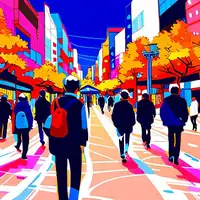
11. Harajuku Takeshita Street
Known for its youthful, bold fashion, Takeshita Street is in Harajuku, offering unique and trendy fashion items.
- Trend Central: Fashion-forward street attracting a young crowd.
- Unconventional: Unique, quirky outfits and accessories.
- Energetic: High-energy atmosphere with colorful shops.
- Accessibility: Easy to reach from Harajuku Station.
- Photogenic: Instagram-worthy spots abound.
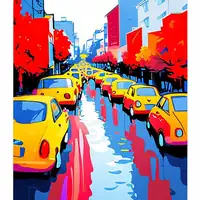
12. Koenji Junjo Shotengai
Known for its retro charm, this shopping street in Koenji offers vintage clothing, quirky items, and delightful snacks.
- Nostalgia: Retro vibe captures old-era Tokyo.
- Thriving Art Scene: Frequent art and music events.
- Laidback: Relaxing atmosphere compared to busy areas.
- Rare Finds: Unique vintage clothes and items.
- Close-knit Community: Friendly shop owners and patrons.
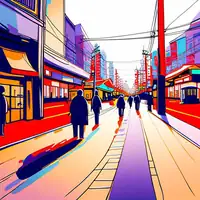
13. Sugamo Jizo-dori Shopping Street
Often called the "Old Ladies' Harajuku," this shopping street is famous for its clothing and products for the elderly.
- Target Audience: Focus on elderly fashion and goods.
- Relaxing Stroll: Wider sidewalks and a slower pace.
- Cultural Insight: Offers cultural experiences and festivals.
- Traditional Foods: Plenty of traditional sweets and snacks.
- Community Events: Regular events for the local community.
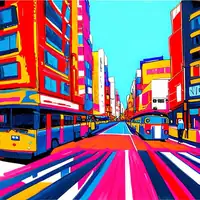
14. Nakano Broadway
This shopping complex is a paradise for anime and manga fans, located in the Nakano district.
- Specialty: Best known for anime, manga, and otaku culture.
- Collector's Heaven: Rare items, figures, and collectibles.
- Nostalgic Appeal: Retro arcade games and vintage stores.
- Browsing Options: Multi-story shopping with varied themes.
- Convenient Access: Short train ride from Shinjuku.
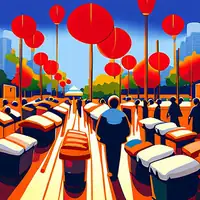
15. Yoyogi Park Flea Market
The Yoyogi Park Flea Market is known for its used clothing, handicrafts, and vintage goods.
- Outdoor Experience: Pleasant outdoor shopping venue.
- Eco-Friendly: Focus on second-hand and upcycled goods.
- Bargain Possibilities: Opportunity to find great deals.
- Diversity: Appealing to a broad audience with its range.
- Timing: Only held on selected weekends.
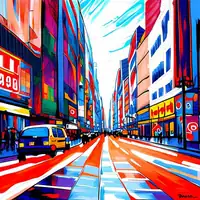
16. Togoshi Ginza Shopping Street
Togoshi Ginza is the longest shopping street in Tokyo and offers a mix of traditional and modern stores.
- Local Flavor: Strong sense of community and local stores.
- Longevity: Historic street with longstanding businesses.
- Gastronomy: Famous for a variety of affordable eateries.
- Scenic Walk: Encompasses long stretches for a pleasant walk.
- Easy Access: Close to public transport.
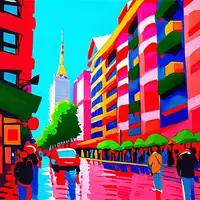
17. Akasaka Sacas
This is a complex full of shops, entertainment, and restaurants with unique market stalls occasionally set up in the area.
- Trendy Spot: Modern shopping and entertainment center.
- Social Hub: Venue for concerts and events.
- Dining Variety: Wide range of international and local food.
- Family-Friendly: Activities suitable for all ages.
- Location: Situated in the lively Akasaka district.

18. Daikanyama T-Site
While primarily a bookstore, T-Site in Daikanyama has a lovely market area as well, filled with niche items and artisanal goods.
- Literary Touch: Books combined with delicate artisan shops.
- Unique Atmosphere: Beautiful architecture and calming vibe.
- Premium Selection: High-quality taste reflects in goods offered.
- Pets Allowed: Pet-friendly spaces, including cafes.
- Upscale Experience: Considered a sophisticated shopping area.
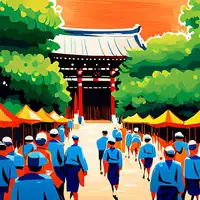
19. Meiji Shrine Treasure House Garden Flea Market
This market is held occasionally and offers antiques and vintage treasures in a culturally significant location.
- Historic Value: Set in the grounds of a famous shrine.
- Traditional Appeal: Mix of traditional Japanese goods.
- Unique Treasures: One-of-a-kind antique items.
- Serene Environment: Peaceful and culturally enriched shopping.
- Seasonal: Check availability as it is held irregularly.

20. Roppongi Hills
Roppongi Hills is not just a shopping center but also offers local food markets with gourmet and premium items.
- Premium Quality: High-end gourmet foods and products.
- Cosmopolitan Atmosphere: Reflects the global crowd of Roppongi.
- Artistic Influence: Nearby museum and art galleries.
- Dining Options: Upscale restaurants with diverse cuisines.
- Scenic Area: Views and garden spaces within the complex.